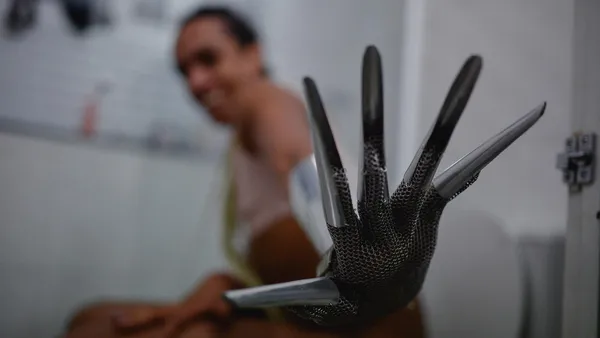Eye For Film >> Movies >> Bixa Travesty (2018) Film Review
Bixa Travesty
Reviewed by: Jennie Kermode

In a society that's just getting to grips with the existence of trans women, trans men and non-binary people, there's a dearth of art that delves into the deeper complexities of gender diversity or explores the way that understandings differ between cultures and regions, never mind the way that individuals seek out their own ways of expressing who they are. Furthermore, the necessity of drawing lines between gender and sexuality to explain that they're not the same thing risks erasing the experiences of people for whom these two aspects of the self are closely intertwined, and has repercussions in the art world. This film plunges viewers into the life of Linn da Quebrada, a performer from São Paulo for whom gender and sexuality are also entangled with political expression as she seeks to challenge the masculine hegemony around her.
Da Quebrada prizes authenticity above subtlety and some of the performances include here are sexually explicit, so anyone bothered by such things would be well advised to stay away. Some people may also be uncomfortable about the English words used to translate 'bixa travesti', which have slightly different social connotations. That said, nothing here really feels gratuitous (even if she might be amused by that). The dancing, the costumes, the radio performances and what she has to say directly all come together as an exploration of identity - her own and others'. Meanwhile, she also explores issues around desire and, specifically, the types of masculine body and expressions of maleness that it's socially acceptable to be attracted to.

Da Quebrada gives the impression of being very much in the driving seat in this documentary, supported by close friend and fellow performer Jup do Bairro. The directors take what is primarily an observational approach, with only intermittent scenes clearly set up to encourage specific discussions. In return for this they get intimate access to their star's day to day life. We see her backstage, at home washing dishes, even in the shower. There's a remarkable consistency about all of this that prompts a question: is she performing all the time, or is her on-stage persona simply her real self with the volume turned up?
With Jair Bolsonaro, who has previously threatened violence against LGBT people, due to take power in Brazil in January, da Quebrada's work has never been more vital or more dangerous. The election having taken place after filming was completed, this context is not referenced in the documentary itself but nevertheless gives it an additional edge. Despite her celebrity, she doesn't have money to hide behind; there's an edge of class politics to her work as well. With more and more Brazilian LGBT performers beginning to leave the country or go underground, this is an important chance to listen to voices that may soon be silenced.
Reviewed on: 07 Dec 2018















